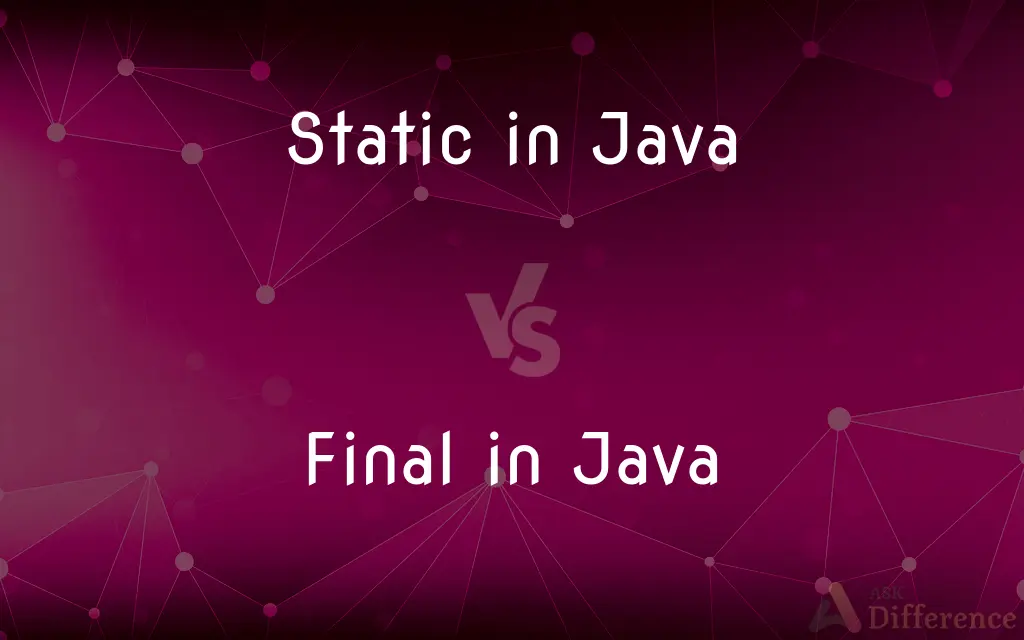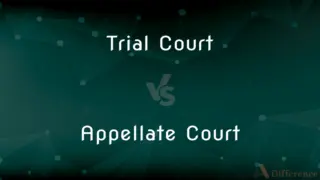Static in Java vs. Final in Java — What's the Difference?
By Tayyaba Rehman — Published on January 2, 2024
'Static' in Java signifies a single instance shared among all instances of a class, while 'Final' denotes a constant that can't be changed once initialized.

Difference Between Static in Java and Final in Java
Table of Contents
ADVERTISEMENT
Key Differences
Static in Java refers to a class member shared by all instances. It can be accessed without creating an object of the class, making it suitable for constants or methods common to all objects.
Final in Java defines an entity as unchangeable. For variables, it indicates a constant value that cannot be altered after initialization. For methods, it prevents overriding.
Static elements belong to the class rather than individual instances, allowing direct access without object instantiation. This facilitates memory efficiency by sharing common properties among objects.
Final variables cannot be reassigned after initialization, ensuring their immutability throughout the program. Final methods can't be overridden, securing the method's implementation.
Static methods are associated with the class, not with an instance, allowing access without object creation. They're useful for utilities, helper functions, or constants.
ADVERTISEMENT
Final fields and variables indicate constants, preserving their assigned value throughout program execution. Final classes cannot be extended, ensuring their integrity.
Comparison Chart
Mutability
Shared among instances, can change unless declared final
Immutable, cannot be modified once initialized
Accessibility
Accessible without object instantiation
Accessed through object, retains constant value
Class Association
Associated with class, shared among all instances
Ensures constants or unchangeable fields/methods
Memory Efficiency
Memory-efficient due to shared properties among instances
Guarantees value integrity, preventing reassignment
Usage
Suitable for utilities, common properties, or helper methods
Preserves constant values or methods from modification
Compare with Definitions
Static in Java
Allows direct access.
Static methods are called directly on the class, not requiring object creation.
Final in Java
Immutability assurance.
Final variables ensure their assigned value remains constant.
Static in Java
Shared memory efficiency.
Using static variables saves memory by sharing properties among instances.
Final in Java
Integrity assurance.
Final classes and methods ensure their defined structure remains unchanged.
Static in Java
Common among instances.
Static fields maintain a single value across all instances of a class.
Final in Java
Immutable constants.
Final indicates constants in Java programming.
Static in Java
Shared class-level entity.
Static variables are shared among all instances of a class.
Final in Java
Prevents reassignment.
Final fields cannot be changed after initialization.
Static in Java
Class-associated properties.
Static elements belong to the class, not to individual instances.
Final in Java
Method/Value protection.
Final methods secure their implementation from overriding.
Common Curiosities
Can I access static methods without creating an object?
Yes, static methods can be accessed directly using the class name without object instantiation.
Can a final method be overridden in Java?
No, final methods cannot be overridden in subclasses, ensuring their original implementation is retained.
Can static variables be accessed through an instance of the class?
Yes, although it's recommended to access static variables using the class name rather than an instance.
Are static variables specific to each instance of a class?
No, static variables are shared among all instances, maintaining a single value across all objects.
What is the primary advantage of using static methods?
Static methods offer direct access without object instantiation, providing utility or helper functionalities.
Are static methods overridden in subclasses?
No, static methods are not overridden but can be redefined with the same signature in subclasses.
Can a final variable change its value after initialization?
No, final variables are constants and cannot be reassigned after their initial value is set.
Are final variables mandatory to be initialized at the time of declaration?
Yes, final variables must be initialized when declared or within a constructor.
Can static methods access non-static variables?
No, static methods cannot directly access non-static instance variables.
Is a final method inherited by subclasses in Java?
Yes, a final method can be inherited by a subclass but cannot be overridden.
Can we declare static methods in interfaces?
Yes, Java allows defining static methods within interfaces to provide utility functionalities.
Can a final variable be initialized multiple times in Java?
No, once a final variable is assigned a value, it cannot be changed or reinitialized.
Can a final class be extended in Java?
No, final classes cannot be extended or subclassed, ensuring the class's integrity.
Can we declare a static block in an interface?
No, static blocks can't be declared within an interface in Java; they're limited to classes and not interfaces.
Are final variables and constants the same in Java?
Yes, final variables often represent constants due to their unchangeable nature after initialization.
Share Your Discovery

Previous Comparison
Air Mattress vs. Water Mattress
Next Comparison
COMMIT in SQL vs. ROLLBACK in SQLAuthor Spotlight
Written by
Tayyaba RehmanTayyaba Rehman is a distinguished writer, currently serving as a primary contributor to askdifference.com. As a researcher in semantics and etymology, Tayyaba's passion for the complexity of languages and their distinctions has found a perfect home on the platform. Tayyaba delves into the intricacies of language, distinguishing between commonly confused words and phrases, thereby providing clarity for readers worldwide.
















































